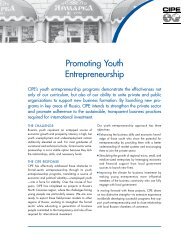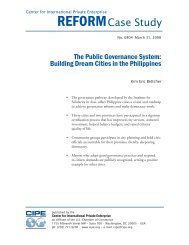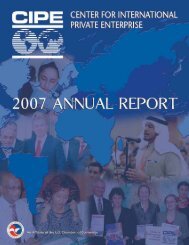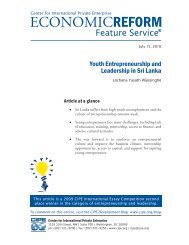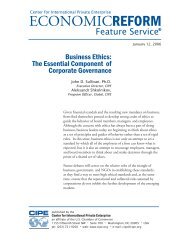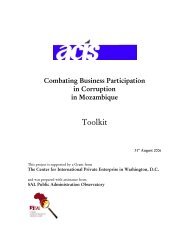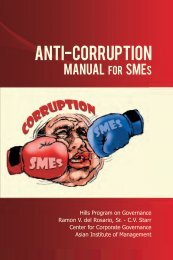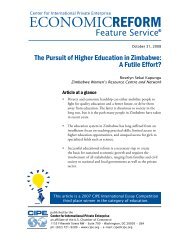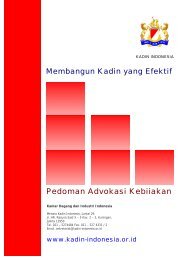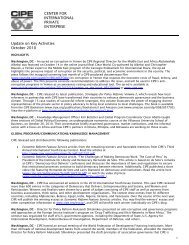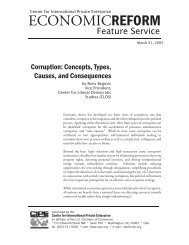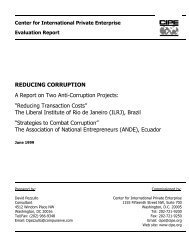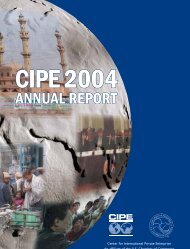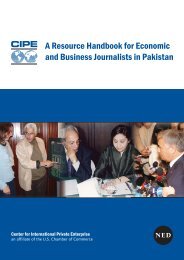Responsible Business Guide: A Toolkit for Winning Companies
Responsible Business Guide: A Toolkit for Winning Companies
Responsible Business Guide: A Toolkit for Winning Companies
You also want an ePaper? Increase the reach of your titles
YUMPU automatically turns print PDFs into web optimized ePapers that Google loves.
RBG<br />
<strong>Responsible</strong> <strong>Business</strong> <strong>Guide</strong>: A <strong>Toolkit</strong> <strong>for</strong> <strong>Winning</strong> <strong>Companies</strong><br />
RBF Pillar 6:<br />
Financial Viability and Capitalization<br />
The primary responsibility of a business is to remain profitable. Yet a company can pursue<br />
financial success without necessarily extracting an unfair cost from the environment or<br />
workers by making processes and personnel systems more efficient.<br />
How Investors Define <strong>Responsible</strong> <strong>Business</strong><br />
Perhaps the most reliable touchstone of a company’s financial viability is the market itself.<br />
We can judge the sustainability of a company by the faith investors have in it. The rapid<br />
rise of socially responsible investment (SRI) indexes over a short span of time is a clear<br />
indicator that investors prefer to put their money in responsible companies. In the eight<br />
years since SRIs emerged, social investment has increased twenty times. Additionally, SRI<br />
capital value has increased in proportion, significantly in excess of traditional investments.<br />
It is clear that companies considered responsible are competing effectively against those<br />
considered less so.<br />
Social investing... from $40 billion in 1984<br />
to $825 billion in 1991... in firms that “do<br />
the right thing” rather than divesting of<br />
firms that “do the wrong thing.”<br />
Pamela L. Hall and Robin Rieck in “The Effect of Positive<br />
Corporate Social Actions on Shareholder Wealth”<br />
At the same time, consumer surveys report a<br />
heightened consciousness about fair trade<br />
products, with 100% of young buyers in the UK<br />
expressing a preference <strong>for</strong> ethically-sourced<br />
products, even if the price is relatively higher.<br />
Sales of products labeled <strong>for</strong> ethical or<br />
environmentally friendly production have<br />
continued to climb, with more and more<br />
mainstream brands like Nestle adding fair-trade<br />
products to their portfolios.<br />
Where companies are family owned, a combination of traditional factors may define business<br />
success, including repeat business from customers, gaining new customers, and expanding<br />
sales, often in new markets and products. What better measure of a company’s success<br />
than its balance sheet? However, as many family-owned companies are learning, the balance<br />
sheet alone is becoming less preferred as a gauge of overall corporate success. Consumers,<br />
clients, trading partners, investors, even governments and chambers of commerce or trade<br />
bodies are adding emphasis to assessing corporate per<strong>for</strong>mance by looking beyond the<br />
balance sheet.<br />
<strong>Responsible</strong> <strong>Business</strong> Initiative 47



